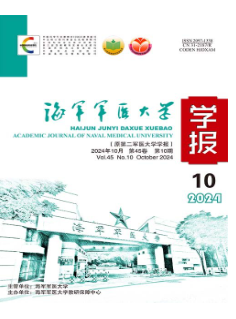2019冠状病毒病医护人员抗压防护口罩的有效性研究
Q4 Medicine
引用次数: 0
摘要
目的评价医护人员抗击2019冠状病毒病(新冠肺炎)的有效性。方法采用方便抽样法,选取2020年1月26日至2月24日支援武汉医疗队的120名军队一线抗疫医护人员,对照组和观察组空白组不使用抗压力敷料,对照组在使用水胶体敷料后佩戴面部防护装备,观察组在使用抗压力防护面罩后佩戴面部保护装备。干预结束时,面部舒适度、面部压力损伤、,结果干预结束时,空白组的面部舒适度得分为6 00(6 00,7 00),对照组为5 00(4 00,5 00),观察组为1 00(0 50,2 00),三组之间存在显著差异(H=97392,P<;0 001),空白组面部舒适度等级平均值最大(96 68),而观察组面部舒适程度等级平均值最小(20 88)。干预结束时,空白组有3例(7 5%,3/40)没有面部损伤,28例(70 0%,28/40)在第一阶段有面部压力损伤,9例(22 5%,9/40)在第二阶段有面部挤压损伤;对照组1期无面部损伤27例(67.5%,27/40),面部压力损伤13例(32.5%,13/40);观察组37例(92.5%,37/40)无面部损伤,3例(7.5%,3/40)1期有面部压力损伤。三组面部压力损伤发生率差异有统计学意义(χ2=71863,P<;0.001)观察组的面部压力损伤率在三组中最低结论高压防护面罩能有效降低面部压力性损伤的发生率,提高佩戴面罩时的面部舒适度,可用于一线抗疫医护人员的防护本文章由计算机程序翻译,如有差异,请以英文原文为准。
Effectiveness of anti-pressure protective mask for medical personnel fighting against coronavirus disease 2019
Objective To evaluate the effectiveness of anti-pressure protective mask for medical personnel fighting against the coronavirus disease 2019 (COVID-19) Methods Convenience sampling method was used to select 120 military frontline anti-epidemic medical personnel supporting Wuhan medical team from Jan 26 to Feb 24, 2020, and they were evenly divided into blank group, control group and observation group The blank group did not use anti-pressure dressings, the control group wore face protection equipments after using hydrocolloid dressings, and the observation group wore face protection equipments after using anti-pressure protective mask At the end of the intervention, the facial comfort, facial pressure injuries, and adverse effects were compared between the three groups Results At the end of the intervention, the facial comfort score was 6 00 (6 00, 7 00) in the blank group, 5 00 (4 00, 5 00) in the control group, and 1 00 (0 50, 2 00) in the observation group, with significant differences found among the three groups (H=97 392, P<0 001) According to the further inference of the rank mean, the blank group had the largest facial comfort rank mean (96 68), while the observation group had the smallest facial comfort rank mean (20 88) At the end of the intervention, three cases (7 5%, 3/40) in the blank group had no facial injury, 28 cases (70 0%, 28/40) had facial pressure injury at stage 1, and nine cases (22 5%, 9/40) at stage 2;27 cases (67 5%, 27/40) in the control group had no facial injury and 13 cases (32 5%, 13/40) had facial pressure injury at stage 1;37 cases (92 5%, 37/40) in the observation group had no facial injury and three cases (7 5%, 3/40) had facial pressure injury at stage 1 There was significant difference in the incidence of facial pressure injuries among the three groups (χ2=71 863, P<0 001) The observation group had the lowest facial pressure injury rate among the three groups There was no skin allergic reaction in the three groups and none of them was infected with COVID-19 Conclusion Anti-pressure protective mask can effectively reduce the incidence of facial pressure injuries and improve the facial comfort when wearing facial protective equipment, and it can be used for protecting frontline anti-epidemic medical personnel
求助全文
通过发布文献求助,成功后即可免费获取论文全文。
去求助
来源期刊

海军军医大学学报
Medicine-Medicine (all)
CiteScore
0.50
自引率
0.00%
发文量
14752
期刊介绍:
Founded in 1980, Academic Journal of Second Military Medical University(AJSMMU) is sponsored by Second Military Medical University, a well-known medical university in China. AJSMMU is a peer-reviewed biomedical journal,published in Chinese with English abstracts.The journal aims to showcase outstanding research articles from all areas of biology and medicine,including basic medicine(such as biochemistry, microbiology, molecular biology, genetics, etc.),clinical medicine,public health and epidemiology, military medicine,pharmacology and Traditional Chinese Medicine),to publish significant case report, and to provide both perspectives on personal experiences in medicine and reviews of the current state of biology and medicine.
 求助内容:
求助内容: 应助结果提醒方式:
应助结果提醒方式:


